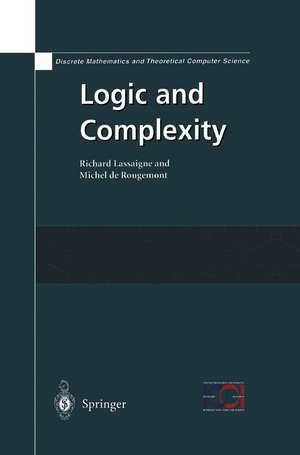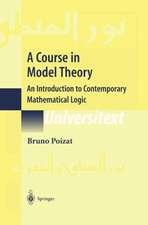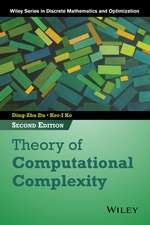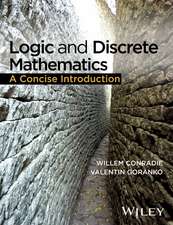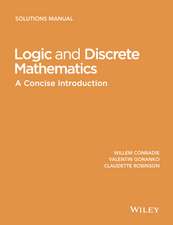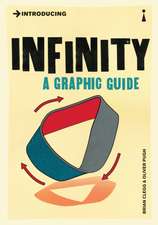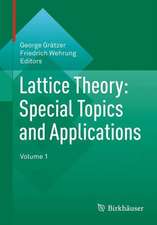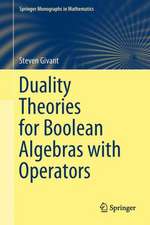Logic and Complexity: Discrete Mathematics and Theoretical Computer Science
Autor Richard Lassaigne, Michel de Rougemonten Limba Engleză Hardback – 20 ian 2004
Divided into three parts, it covers:
- Model Theory and Recursive Functions - introducing the basic model theory of propositional, 1st order, inductive definitions and 2nd order logic. Recursive functions, Turing computability and decidability are also examined.
- Descriptive Complexity - looking at the relationship between definitions of problems, queries, properties of programs and their computational complexity.
- Approximation - explaining how some optimization problems and counting problems can be approximated according to their logical form.
Logic is important in Computer Science, particularly for verification problems and database query languages such as SQL. Students and researchers in this field will find this book of great interest.
| Toate formatele și edițiile | Preț | Express |
|---|---|---|
| Paperback (1) | 1047.88 lei 43-57 zile | |
| SPRINGER LONDON – 8 oct 2012 | 1047.88 lei 43-57 zile | |
| Hardback (1) | 997.38 lei 43-57 zile | |
| SPRINGER LONDON – 20 ian 2004 | 997.38 lei 43-57 zile |
Preț: 997.38 lei
Preț vechi: 1246.73 lei
-20% Nou
Puncte Express: 1496
Preț estimativ în valută:
190.84€ • 199.80$ • 157.91£
190.84€ • 199.80$ • 157.91£
Carte tipărită la comandă
Livrare economică 07-21 aprilie
Preluare comenzi: 021 569.72.76
Specificații
ISBN-13: 9781852335656
ISBN-10: 1852335653
Pagini: 368
Ilustrații: X, 361 p.
Dimensiuni: 155 x 235 x 22 mm
Greutate: 0.7 kg
Ediția:2004
Editura: SPRINGER LONDON
Colecția Springer
Seria Discrete Mathematics and Theoretical Computer Science
Locul publicării:London, United Kingdom
ISBN-10: 1852335653
Pagini: 368
Ilustrații: X, 361 p.
Dimensiuni: 155 x 235 x 22 mm
Greutate: 0.7 kg
Ediția:2004
Editura: SPRINGER LONDON
Colecția Springer
Seria Discrete Mathematics and Theoretical Computer Science
Locul publicării:London, United Kingdom
Public țintă
ResearchCuprins
1. Basic model theory and computability.- 1. Propositional logic.- 2. Deduction systems.- 3. First-order logic.- 4. Completeness of first order logic.- 5. Models of computation.- 6. Recursion and decidability.- 7. Incompleteness of Peano arithmetic.- 2. Descriptive Complexity.- 8 Complexity: time and space.- 9. First-order definability.- 10. Inductive definitions and second-order logic.- 11. Time complexity : the classes P and NP.- 12. Models of parallel computations.- 13. Space complexity: the classes L, FL, NL and PSPACE.- 14. Definability of optimization and counting problems.- 3. Approximation and classes beyond NP.- 15. Probabilistic Classes.- 16. Probabilistic verification.- 17. Approximation.- 18. Classes beyond NP.- List of Figures.
Caracteristici
Includes exercises at end of each chapter Authors website will be maintained for corrections, exercises, remarks and updates Describes a logical approach to complexity theory, for computer scientists Presents new material, close to the current research Unifies with a common notation many areas of theoretical computer science Includes supplementary material: sn.pub/extras
